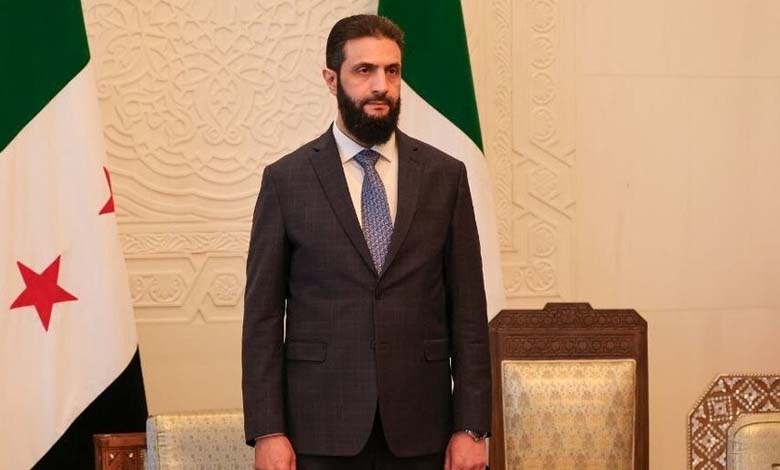Did Al-Sharaa Require U.S. Protection to Attend the Arab Summit in Baghdad?

An Iraqi government source confirmed that Ahmad Al-Sharaa, Syria’s transitional president, requested additional security guarantees from both Iraqi authorities and the U.S., particularly protection by an American private security company, amid threats from militias and forces linked to Tehran.
As the Arab Summit in Baghdad approaches on May 17, doubts are mounting about the participation of President Ahmad Al-Sharaa amid serious security concerns raised in recent days. Observers describe the current climate as a “sensitive security environment” dominated by Tehran-aligned militias and factions, some of which have explicitly opposed his presence in the Iraqi capital.
-
Israeli Airstrikes Near Presidential Palace to Warn al-Sharaa Over Targeting Druze
-
Ahmed Al-Sharaa Woos Trump: Peace with Israel in Exchange for Lifting the Siege
An Iraqi government source told the Kurdish-Iraqi outlet “Shafaq News” on Monday that Al-Sharaa requested security guarantees beyond the usual for such events, primarily protection via a U.S. private security firm. This was interpreted as a sign of distrust towards the official entities managing Baghdad’s security—entities Al-Sharaa believes are influenced by Iran.
Although the Iraqi government officially invited Al-Sharaa to the summit—an important step in the thaw between Baghdad and Damascus after years of estrangement—the invitation sparked political controversy, particularly among pro-Iranian factions. Some revived Al-Sharaa’s past, when he was known as “Abu Mohammad al-Jolani,” due to his jihadist activity in Iraq during the height of Al-Qaeda’s presence there.
-
Al-Sharaa Responds to Criticism of His Government: Satisfying Everyone Is an Impossible Task
-
Will Al-Sharaa Renew His Relationship with the Muslim Brotherhood or Exclude Them from the Political Scene?
Legal questions arose about the possibility of prosecuting him, but Iraqi legal experts asserted that his current role as head of state grants him full diplomatic immunity under international law, invalidating any previous arrest warrants.
According to sources close to the Syrian presidency, Damascus is not only concerned with Al-Sharaa’s legal history in Iraq, but more urgently with the implicit threats from pro-Iranian militia leaders who consider his attendance an “unacceptable provocation.” Other political blocs, like the Coordination Framework, kept their stance ambiguous, calling the invitation “pure protocol” without clear support or rejection.
-
Nechirvan Barzani Calls for Helping Ahmad Al-Sharaa Bring Syria Out of Crisis
-
The U.S. Administration and Syria: Caution and Skepticism Towards the New Regime Led by Ahmad Al-Sharaa
This ambiguity led Al-Sharaa to conclude that Iran’s position on his visit is uncertain—especially given Tehran’s conspicuous silence, which, while not overtly opposing the visit, has not offered any reassurance to Damascus about the safety of the Syrian delegation.
A well-informed Syrian source stated, “Al-Sharaa does not trust the Iraqi government, despite its good intentions, to maintain security during the summit—particularly since some key security institutions remain directly or indirectly influenced by Iran-aligned factions.”
-
Al-Sharaa Pledges to Form an Inclusive Government in His First Speech to Syrians
-
Formation of a New Armed Group to Confront Ahmed Al-Sharaa – Details
The Syrian president’s request for protection by a private U.S. security firm reflects the depth of Syria’s concern regarding Baghdad’s security environment. The request conveys a dual political message: a lack of trust in Iraq’s guarantees, and an attempt to neutralize actors who might see his presence as a threat or provocation.
This comes amid Qatar’s active mediation between Damascus and Baghdad. A previous meeting between Iraqi Prime Minister Mohammed Shia Al-Sudani and Al-Sharaa in Doha paved the way for the formal summit invitation. However, while Doha supports the visit, it lacks the executive tools to ensure Al-Sharaa’s security on Iraqi soil, further complicating matters.
-
Have Foreign Fighters Become a Burden on the New Syria?
-
Has al-Joulani become moderate or is he simply acting with pragmatism and caution? A political science professor responds
Though the Coordination Framework—the leading pro-Iranian coalition—has not formally opposed Al-Sharaa’s attendance, recent statements from figures such as Ammar Al-Hakim and Hadi Al-Amiri downplayed the invitation as “mere protocol,” likely to avoid openly challenging Tehran.
More troubling are veiled threats issued by militia leaders warning against “using the summit to rehabilitate figures involved in shedding Iraqi blood”—comments Al-Sharaa’s inner circle interpreted as indirect personal threats.
-
Turkey seeks to establish a base in Syria to monitor the Kurdish forces and Israeli influence
-
Gunmen launch attacks on Israeli army in southern Syria
Following the announcement of his invitation, several Iraqi media outlets and social media platforms launched unprecedented campaigns condemning what they called “the Iraqi government’s attempt to legitimize former jihadists in regional forums.” This reflects deep internal divisions in Iraq regarding Syria and its new leadership.
Should the Syrian president’s visit to Baghdad occur, it would mark a pivotal moment in the normalization of Damascus’s ties with Arab capitals. Al-Sharaa seeks to prove that Syria, under his leadership, is reclaiming its place in the Arab world after years of isolation. But serious security concerns and opposition from influential forces render his participation in the Baghdad summit fraught with risk amid genuine fears of assassination or targeting attempts.












